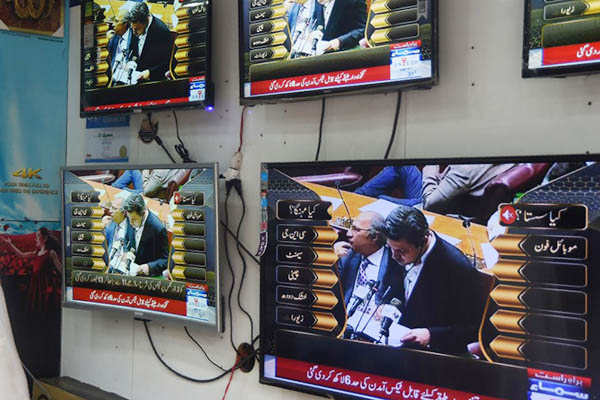
Asif Hassan—AFP
The Rs. 7.02 trillion budget proposes increasing minimum wage, lowering income tax exemption for salaried
Prime Minister Imran Khan’s Pakistan Tehreek-e-Insaf-led government vowed to collect more taxes and make cuts in spending in the first budget of its tenure, presented to Parliament on Tuesday, weeks after reaching a deal with the IMF for a $6 billion bailout.
Before a rowdy parliamentary session, the government announced plans to slash civil expenditure and freeze military spending while promising to substantially raise revenues to stem a yawning fiscal deficit, as it pledged to collect Rs. 5.5 trillion in taxes.
“We have slashed the civil budget by five percent while the military budget will remain the same,” said Hammad Azhar, minister of State for Revenue, as he announced the details of the plan. “The financial year 2019-2020 will be a year for economic stability. We will make some tough decisions and will try to save the poor public from the effects of those tough decisions,” he added.
Azhar went on to highlight a range of new taxes and increases in existing levies in the new budget, saying raising revenues was pivotal to stabilizing the country’s economy. “As long as we do not improve our tax system Pakistan cannot prosper,” said Azhar. Under the new rules, the legal limit for income tax exemption has been lowered to Rs. 600,000/year from an earlier Rs. 1,200,000 for salaried individuals and Rs. 400,000/year for non-salaried.
In addition, the new budget promises to introduce a tax on the services sector and imposes a 17 percent tax on oil, ghee, and similar cooking oils.
The total budget outlay for the 2019-20 fiscal is Rs. 7.022 trillion, with a tax collection target of Rs. 5.5 trillion. The general sales tax has been kept constant at 17 percent, with sales tax on restaurants and bakeries being reduced to 4.5 percent while the tax on sugar, fish, meat, and chicken has been increased to 17 percent. The budget also proposes removing 3 percent of value-added tax on mobile phones.
The federal budget also calls for the tax-to-GDP ratio to be increased to 12.6 percent and has proposed increasing the minimum wage to Rs. 17,500. Under the 2019-20 budget, Rs. 3.255 trillion will be transferred to the provinces under the seventh NFC Award, which is 32 percent higher than last year’s Rs. 2.465 trillion.
The budget has also allocated Rs. 1.8 trillion for national development and Rs. 950 billion for federal development, while the armed forces’ budget has been set at Rs. 1.15 trillion.
Azhar also announced that Rs. 20 billion and Rs. 15 billion had been allocated to buy land for the Diamer-Bhasha, and Mohmand dams, respectively.
Pakistan has struggled for decades to collect taxes with estimates suggesting that only around one percent of the 200-million strong population filed a return in 2018.
Ahead of the budget presentation, Khan took to airways on Monday for the second time in recent weeks to plead with his countrymen to declare their assets in the latest scheme aimed at increasing tax revenues.
The budget session was dominated by a vocal opposition following a string of arrests of their leaders this week, with members of the Pakistan Peoples Party and Pakistan Muslim League (Nawaz) chanting throughout the proceedings, often drowning out Azhar.
The presentation of Khan’s first budget comes just a day after the government released the latest round of bleak economic figures for the cash-strapped country, showing growth for the current fiscal year falling to 3.3 percent—well below the 6.2 percent target.
Discontent is simmering in Pakistan following repeated devaluations of the rupee, soaring inflation, and increasing utility costs.
The economic pain follows months of failed efforts by Khan’s administration to stave off ballooning fiscal and balance of payments deficits, along with low tax yields and mounting debt. The agreement eked out with the IMF still needs final approval by the fund’s board, and it is widely believed the body was waiting to see details of the budget before giving the final sign-off.
Analysts have warned the IMF deal would likely come with myriad restrictions that could bridle Khan’s grand promises to build an Islamic welfare state, as the country is forced to tighten its purse strings.
Pakistan’s increasing economic woes also come as the country is facing possible sanctions from the Financial Action Task Force—a money-laundering monitor based in Paris—for failing to rein-in terror financing. The organization will decide soon whether to add Pakistan to a blacklist that would trigger automatic sanctions, further weakening an already-faltering economy.
